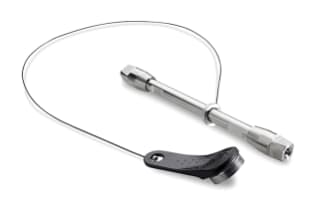
BioResolve SCX mAb, 3 μm, corrosion–resistant columns which contain non-porous, polymer-based particles grafted with a rigorously-optimized, multi-component network of negatively charged sulfonic acid ligands. This innovative column technology, delivers reproducible, high-resolution, charged-based separations of mAbs and other proteins in both LC and LC-MS applications using robust salt or pH gradient methods. This P/N also contains one vial of the mAb Charge Variant Standard (P/N 186009065)
|
pH Range Min |
3 pH |
|
Bonding Technology |
SCX |
|
Particle Shape |
Spherical |
|
Particle Size |
3 µm |
|
QC Tested |
Protein |
|
Format |
Column |
|
System |
UHPLC, HPLC, UPLC |
|
Inner Diameter |
2.1 mm |
|
Length |
100 mm |
|
eCord |
Yes |
|
UNSPSC |
41115709 |
|
Application |
Protein |
|
Brand |
BioResolve |
|
Product Type |
Columns |
|
Units per Package |
1 pk |

BioResolve SCX mAb Column, 3 µm, 2.1 mm x 100 mm 1/pk with mAb Charge Variant Standard
A rigorously designed, multi-component network of negatively charged sulfonic acid ligands is grafted onto non-porous, polymer-based BioResolve SCX mAb columns that are 3 μm in size and resistant to corrosion. Using reliable salt or pH gradient approaches, this cutting-edge column technology achieves reproducible, high-resolution, charged-based separations of mAbs and other proteins in both LC and LC-MS applications. One vial of the mAb Charge Variant Standard (P/N 186009065) is also included in this P/N.
Integrate the BioResolve SCX mAb Column into your lab to take advantage of its unique features. Just increase peak capacity with the BioResolve SCX mAb Column to improve component resolution. The corrosion-resistant 3 µm BioResolve SCX mAb Column is made of non-porous polymer-based particles that have been grafted with a multi-component network of negatively charged sulfonic acid ligands. Using dependable salt or pH gradient approaches, this cutting-edge column technology enables reproducible, high-resolution, charged-based separations of mAbs and other proteins in both LC and LC-MS applications.
Waters manufactures the BioResolve SCX mAb Column in a cGMP, ISO 9001-certified facility with ultra-pure reagents, as well as other Waters equipment and packaging materials. Every BioResolve SCX mAb Column is individually tested as an additional assurance that you will only receive top-notch goods from us. A Performance Chromatogram and Certificate of Batch Analysis are also provided, either on the eCordTM Intelligent Chip or in the column box. The batch number, unbonded particle analysis, bonded particle analysis, chromatographic results, and conditions are all included in the Certificate of Analysis for each batch of packing material.
Depending on your needs, you can browse and shop for lab equipment through our online store. Additionally, we advise you to look at the HILIC QC Reference Material. The HILIC QC Reference Material was developed as a standard to help with benchmarking this form of separation. It is a four-component mixture that was specifically created as a batch test standard for ACQUITY UPLC BEH HILIC columns. It contains an un-retained void marker, a polar neutral compound, and two polar basic compounds that enable a stable chromatographic separation for HILIC columns.
What Does A Phenyl Group Look Like?
A phenyl group is composed of a cluster of six carbon atoms that are arranged in a hexagonal planar ring and tied together. Five of the carbon atoms are connected to different hydrogen atoms, and the sixth is joined to a substituent. The use of phenyl groups is common in organic chemistry.